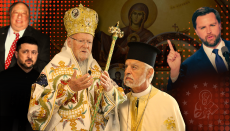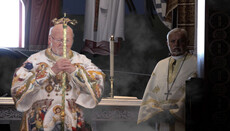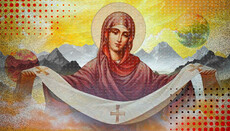Review: "How To Live a Holy Life" by Met. Gregory (Postnikov) of St. Petersburg

A Practical and Profound Orthodox Guide to Daily Life
One of the most common points of discussion in Orthodox circles is how to apply theology to one’s everyday life. It is easy to conceive of the idea that one must attend Divine Liturgy on Sundays and get connected with a parish to see what Orthodoxy is truly like, as online activity and books can only give you so much. But what does one do for their day-to-day routine? How does one navigate their jobs, families, and everyday interactions in a manner that is truly Orthodox? We are called to not be “of the world” while still being in the world and so having to walk that line is an important yet difficult question to answer (John 17:16).
While there are many works out there that can provide guidance on this matter, one that I think any Orthodox Christian, whether they be cradle or converts, catechumens or veterans, can benefit from is How to Live a Holy Life by Metropolitan Gregory (Postnikov) of St. Petersburg, published by the imprint of Holy Trinity Publications called The Printshop of St. Job of Pochaev. This short book provides a framework for how an Orthodox Christian can conduct his daily life in accordance with the teachings of the Church. Detailing methods and practical steps, Gregory gives Orthodox Christians a much-needed overview of how the Christian life is not just limited to Sunday liturgy and the home, but encompasses all aspects of our reality, and thus we need to be properly informed and prepared as to how to act as Orthodox within our jobs, with our companions, and when going about our day.
Book Layout and Synopsis
Metropolitan Gregory’s book is made up of 12 chapters, along with a conclusion, a section on how to spend one’s Sunday, an afterward, and then a short biography of the metropolitan, with the book consisting of around one hundred fifty pages of writing total.
The first chapter is titled “Appeal to the Christian”, which challenges the reader to seriously contemplate if the life he is living is actually that of a Christian. It then exhorts him to consider the advice that the Metropolitan will give him, and that this will be the only sort of instruction that he will need since he can then form his life around these steps for the rest of his days (pg. 8).
From here follow the rest of the main chapters of the work, each one being dedicated to a different part of the day and showing how Christians should best conduct themselves. It goes from morning prayer to the working day, to meals, and finally to evening prayer and sleep. It also gives different pieces of advice to be applied for specific states in life or situations may one encounter, such as being rich vs being in poverty, when receiving praise from someone, etc.
Following this is the book’s conclusion and then a separate chapter being dedicated exclusively to how one’s routine should go on Sundays, as the Metropolitan states in the conclusion itself that the advice he has laid out works for every day of the week except for Sunday and holy days (pg. 110). The last written section of the text is a short biography on Metropolitan Gregory, a much-appreciated feature that I have seen included in other texts by Holy Trinity Publications and different Orthodox works as well.
Review
There is much to be praised about this book, and it is for this reason that I think it is a worthwhile read for Orthodox of any station or place in life.
For one, the book is not a demanding read in terms of length, being a little under one hundred fifty pages. It is also written in a manner that is incredibly direct and straight to the point; Gregory’s instructions are easy to understand, and do not require an extensive knowledge of Scripture or broader theology to approach the text and derive benefit from it.
One of my initial concerns with this book was that it would present a way of life that would sound like a great ideal to strive for, but would ultimately be unattainable for lay people like myself. I have learned this sort of skepticism from experience, having been warned previously to approach works on prayer and asceticism by monastics with some degree of caution, so as to not confuse the life of the lay person with the life of the monk. However, Metropolitan Gregory’s book does not have this issue. It is very clear that Gregory had the heart and mind of a pastor, and constructed this work in a way so that most ordinary Orthodox Christians could apply it to their every day lives. It is almost shocking how a book printed over a hundred years ago can still remain so relevant to today’s Orthodox.
This isn’t to say that what Gregory suggests is not challenging. It certainly requires discipline and dedication, and of course the humility to ask for the grace of Christ to assist us when we feel as if we are unable to keep going. But Gregory shows how the average Orthodox Christian can attain a great degree of holiness and spiritual insight, even while being active in the affairs of the world. We laity may not be priests or monks, but we still have the words of our Lord exhorting us to “be perfect as I am perfect” and so we need to strive with everything we have to seek union with Christ, regardless of our material and spiritual state (Matthew 5:48).
What makes this work so useful is that in a little under one hundred fifty pages, Gregory is able to provide guidance for Orthodox conduct on most “every day scenarios” we may encounter, such as when we are sick, when we are insulted or complimented, or when we are dealing with slander, to name a few examples. Gregory’s wisdom on how to navigate work was also eye opening. He demonstrates how when we do certain tasks, we can take their different parts and use them for spiritual reflection. For example, he says how a baker can reflect on the words of the Lord describing himself as “the bread of Life” and draw a connection back to the Holy Mysteries, or how a carpenter can think of his work as being akin to that of building a “habitation” worthy to be entered into by the Lord (pg. 81, 79). While these specific reflections may apply more to those in the trades, Gregory’s broader advice about work can be utilized in any profession. His main point is that, no matter what work one does, it is ultimately God’s work, and thus one undertaking this work is not undertaking it solely for their own needs or for the needs of their boss or company, but rather it is being done out of obedience to God (pg. 69-70). Working for an earthly reward will only leave the Christian in disappointment, but working for a heavenly reward will cause him to always have Christ on his mind:
“Whoever does his daily work with such a disposition of spirit, no matter what it is and for whom he does it, works actually for the Lord God, and therefore will receive the reward from the Lord God Himself, as the holy apostle attests to slaves, when instructing them whatsoever ye do for your masters in the flesh, do it heartily, as to the Lord, and not unto men, he says, knowing that of the Lord ye shall receive the reward of the inheritance: for ye serve the Lord Christ (Col. 3:23, 24)” (pg. 70).
Gregory utterly rejects the idea that work in it of itself is somehow evil or that it needs to be abolished, but instead shows how the Orthodox conception of man’s temporal labor is directly connected to his spiritual labor, and that obedience to God is partially fulfilled in us faithfully completing the earthly tasks that we are assigned.
Because of its wide applicability, the book can be read for spiritual profit by just about everyone. It would be a great book to include as part of a catechesis program for catechumens, serving as a sort of “introduction” to Orthodox living. At the same time, it can be a great refresher for those who have been in the Church for some time and, while they may have the Liturgy down and are deeply familiar with theological topics, may not be as aware of how to approach a daily routine in a thoroughly Orthodox manner. I found it also helpful for pointing out the “missing pieces” in my own life (and there are many!) showing me where I was forgetting Christ and how to remember Him throughout my day once again. The text may also be useful for inquirers, as Gregory almost exclusively quotes from Scripture, making it an easier introductory Orthodox work for those not familiar with the spirituality of the Church. Anyone wanting to further resemble Christ in their daily routine can find at least some benefit from reading How to Live a Holy Life.
While the whole book is worth reading, the section that I personally found to be the most interesting was his chapter on how to spend one’s Sundays. Metropolitan Gregory provides a list of obligations that an Orthodox Christian should fulfill on our day of rest. These include the setting aside “of all earthly cares” as the Divine Liturgy says (though this doesn’t exclude charitable acts), turning away from all sinful acts, attending the Divine Liturgy, and finally contemplating the wondrous acts of God’s creation (pg. 116-118).
There is also a fifth obligation that Gregory gives us for Sundays, that being to attentively read Scripture. But this isn’t a haphazard reading of it; instead, Gregory provides a method for approaching the Word of God, which involves contemplating a passage from the Bible and meditating on its words, while also consulting an interpretation of the passage from one of the Church Fathers (pg. 132). He also advises that this exercise begins and ends with prayer, “because the holy Apostle commands us, in everything give thanks (I Thess. 5:18). And how can we not give thanks for the saving Divine light that we have received” (pg. 136). There are other instructions that Metropolitan Gregory gives for us, such as a method for contemplating the Passion of Christ, and a sixth obligation of performing an examination of our spiritual state where we renew our intention to live our lives solely dedicated to the commandments of God (pg. 137). Sunday then becomes a sort of “spiritual reset”, where after the six days of work we then turn to the Lord for refreshment and edification.
The last thing I will note about this chapter is his advice for spiritual reading, which I think is important for Orthodox today given how much information we have available to us and the way it often spreads:
“When you begin to read an edifying book, read it in order from beginning to end, and never read as some do, reading only here and there. Because sober-minded writers often place some very useful truths in the beginning of a book, without which what is written in the middle or towards the end often cannot be understood with the appropriate clarity and definiteness.” (pg. 136)
Our education and catechism in the life of the Church cannot consist of half-read books and the reposting of Patristic quotes online (some of which are most likely fake). It needs to be a sincere and dedicated effort, and this means poring over all the facets of our Faith and its great teachers in the Scriptures and the Fathers. It is a grievous form of self-injury to close ourselves off to the treasury that the Church has stored up for us, Her children. We also do a disservice to the very saints we claim to revere and admire when we cherry pick statements they wrote as opposed to beholding the true breadth of the writings they composed and the wisdom contained therein. We turn them into justifications for “pet doctrines” or bludgeons for online debates instead of turning to them as guides that lead us closer to Christ. We must embrace the whole Christ and the whole Church, not just the bits and pieces that seem the most appealing, for as St. Augustine says in Book XVII, section three of Contra Faustum: “For to believe what you please, and not to believe what you please, is to believe in yourselves, and not the gospel”.
But what I think is most important about this book is the fact that that it quashes the idea that one’s life “in the world” and one’s life in the Church are two separate entities. They are not. Orthodoxy is not an accessory; is it not some article of clothing that you put on for special occasions but leave at home most of the time. Metropolitan Gregory’s book reminds us the Faith is with us at all times, and as Orthodox Christians, we are called to be bearers of that Faith at all times. This doesn’t mean we stand on a street corner holding a cross or waiving a “REPENT!” sign, but it does mean that we should conform all of our actions, our choices, and our words to be as close to Christ as we possibly can. We should look at every seemingly mundane moment during our day not as some chore to complete and scratch off from a list or an obstacle to overcome, but as an opportunity to be a witness for the Lord, a living icon of Christ and His Gospel. Instilling this message early on in catechumens and frequently reminding well seasoned Orthodox will go a long way in ensuring the faithful do not grow complacent and become vulnerable to the innumerable snares set for us in our modern times. In short, you are an Orthodox Christian at all times, or you are not an Orthodox Christian at all.
Conclusion
Orthodox Christians of all states of life and of all places within the Church would do themselves a great favor by reading Metropolitan Gregory’s How to Live a Holy Life.
This work is highly accessible while still providing immense and penetrating wisdom for the modern Orthodox Christian. No stone of our every day activities is left unturned, with Gregory finding almost innumerable ways we can turn even the tiniest gesture into a gift to be offered up in Thanksgiving to Jesus Christ. Those actively searching their souls and seeking out how to better imitate Our Lord in all things can do no better to pick up a copy of this book.
May Metropolitan Gregory and St. Job of Pochaev intercede for us to the Holy Trinity!
Lord Jesus Christ, Son of God, Have Mercy on Me, a Sinner
About the Author
Giovanni Del Piero is a graduate from the University of Dallas. He earned a B.A in Politics with a double concentration in Ethics and Theology. He is the author of the Substack publication 'The Poorly Illumined', and resides in Pennsylvania, where he works as an analyst for a consulting firm in the nonprofit sector."









